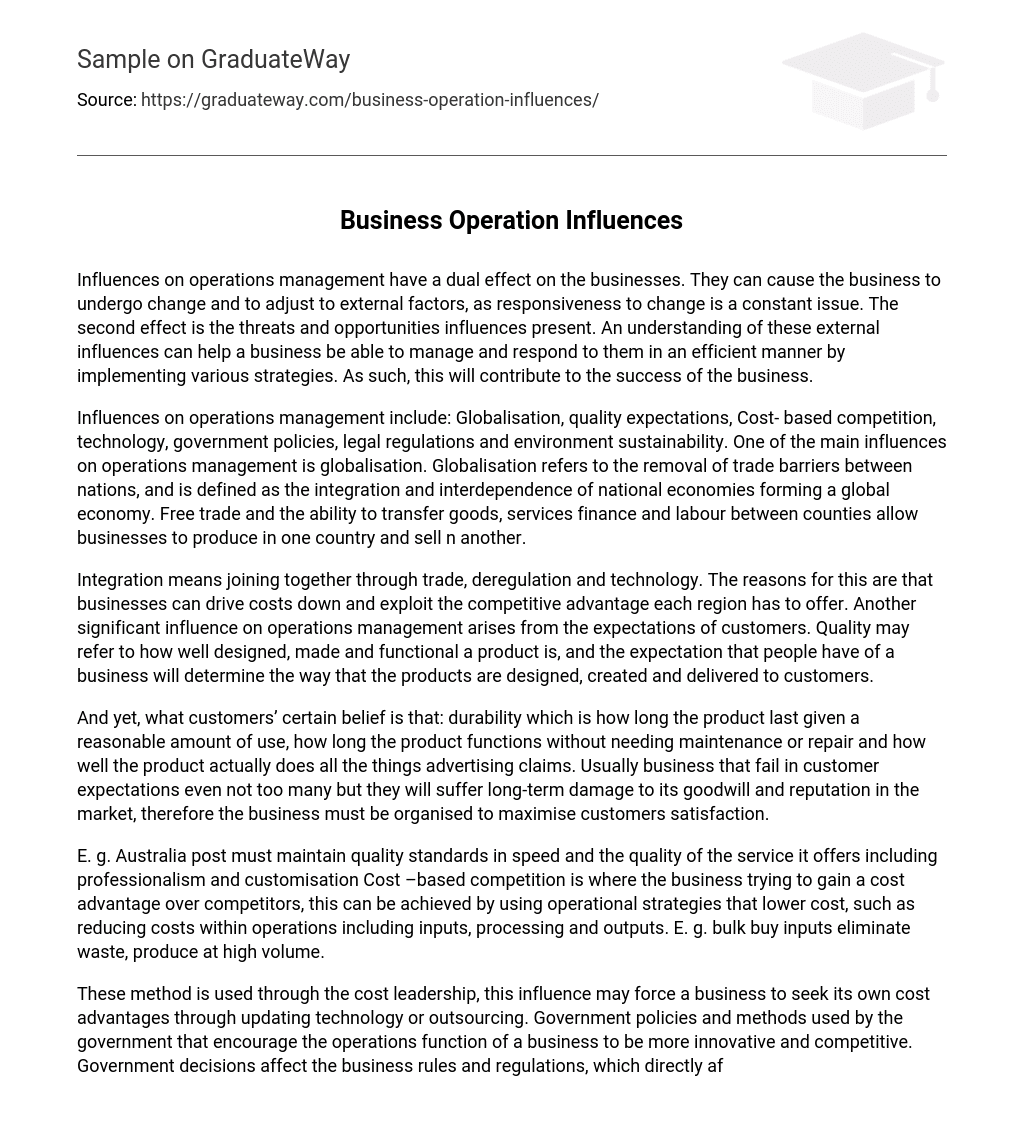Operations management is influenced by external factors, which can both drive change and adaptation in businesses while also presenting threats and opportunities. The recurring concern for flexibility necessitates a comprehensive understanding of these influences. By implementing diverse strategies, businesses can effectively manage and respond to these external factors, ultimately contributing to their overall success.
The factors that impact operations management are globalisation, quality expectations, cost-based competition, technology, government policies, legal regulations, and environmental sustainability. Globalisation is a key influence on operations management as it involves the elimination of trade barriers and the integration of national economies into a global economy. With free trade and the ability to transfer goods, services, finance, and labor across countries, businesses can manufacture in one country and market in another.
Integration refers to the merging of trade, deregulation, and technology driven by businesses’ desire to lower costs and leverage distinct competitive advantages offered by various regions. Moreover, operations management is heavily influenced by customer expectations. It is crucial for a business to ensure that its products meet customers’ quality expectations in terms of design, production, and functionality. As a result, these expectations serve as guiding principles throughout the entire process of designing, manufacturing, and delivering products to customers.
Customer satisfaction is of utmost importance for businesses, as customers place great importance on the durability of products when evaluating their quality. This involves evaluating how long a product will last during regular use, its ability to function without needing maintenance or repairs, and how well it fulfills its advertised claims. Failing to meet these expectations can have long-lasting negative effects on a business’s reputation and position in the market. Therefore, it is crucial for businesses to prioritize customer satisfaction by aligning their operations accordingly.
For example, Australia post is required to maintain certain standards in terms of speed and service, which include professionalism and customizability. Cost-based competition involves businesses attempting to gain a competitive advantage by reducing costs through operational strategies, such as cutting costs in various operations like inputs, processing, and outputs. For instance, buying inputs in large quantities helps eliminate waste and enables high-volume production.
Cost leadership is a strategy employed by businesses to achieve a competitive edge, which may involve upgrading technology or outsourcing to cut costs. Moreover, government policies and approaches can foster innovation and competitiveness in business operations. Consequently, governmental choices concerning regulations directly affect the handling of pivotal business functions. In essence, government policies serve as a substantial catalyst for change and hold considerable sway over operations management.
Various policies, including tax rates, occupational health and safety regulations, training and rules, public health policies, environmental policies, employment relations, trade and industry policies, affect how a business operates. Moreover, government policies strive to diminish the level of protection granted to specific industries by foreign businesses. Laws and regulations play a vital role as an external factor influencing the operational aspects of a business. The aim of government regulation is to foster safety and guarantee ethical business practices.
Australia has implemented legal changes through both parliament and common law courts. Non-compliance with these regulations can have severe consequences for businesses, such as financial and legal problems that damage their reputation and incur significant expenses. Moreover, it is essential to protect the environment from resource depletion and pollution.
It is crucial for managers to safeguard the natural environment and incorporate sustainable resource utilization into production techniques. They must carefully assess factors such as resource depletion, pollution from manufacturing machinery, and waste management. As businesses give priority to sustainability, there might be a rise in expenses for inputs like renewable electricity. Currently, businesses are more aware of the societal and environmental consequences of their choices.
Examples of socially responsible decisions encompass hiring sustainability experts in educational institutions and companies to enforce environmentally sustainable practices and policies. There is a growing inclination among businesses to enhance transparency in their decision-making process. To mitigate unfavorable aspects, managers must adopt a flexible strategy that allows for swift adaptation to new models or alternative business plans. Moreover, technology plays a crucial role as globalization has facilitated the worldwide dissemination of technological advancements.
The progress of technology has resulted in the emergence of novel technologies, designs, construction methods, and innovative devices across diverse industries. The manufacturing sector, in particular, has witnessed the substitution of workers with new technologies. Technology possesses the capability to entirely transform business operations and product offerings. To fulfill customer requirements in this rapidly evolving technological environment, businesses must ensure that their technology stands out from competitors and assess whether staff members need to be retained or possibly laid off due to redundancy.





